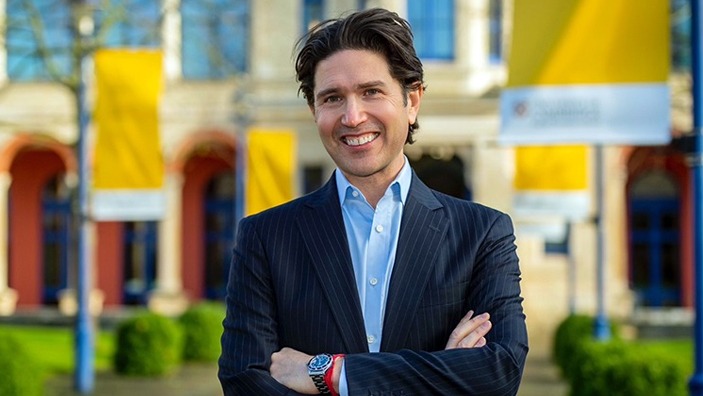While many people believe that physical attractiveness should play no role in whether someone is interviewed or offered a job, scholars have for decades looked at this link – with conflicting results. Research co-authored by Professor Christopher Marquis of Cambridge Judge Business School helps to resolve such contradictions.

Some previous field and laboratory studies have shown that more attractive job candidates are more likely to be hired, but several other studies have found that employers might disfavour attractive candidates – perhaps because they perceive them as more entitled and less hardworking, or assume that they have more options and thus represent a higher turnover risk.
The research by Chris examines this topic in 2 seemingly different employment contexts – China and the United States. The findings forthcoming in the American Journal of Sociology show there is a remarkable similarity in both locations – that the effects of attractiveness depends on consistency with other status characteristics, most notably educational prestige, as well as the fit with the job in question.
The impact of attractiveness and elite education on job selection
While more attractive applicants with elite educational credentials were favoured for higher-status jobs and less attractive candidates from non-elite universities were favoured for lower-status roles, candidates with only one of these characteristics, but not both, fared the worst.
“Our framework implies that status-inconsistent applicants tend to elicit contradictory expectations, which increases evaluation uncertainty, and are thus less likely to be perceived as a good fit for either higher-status or lower-status positions,” the research says. “Taken together, these predictions illuminate not only the critical role of consistency among an actor’s different status characteristics but also the degree of fit between a particular combination of status characteristics and the status of the targeted job.”
In other words, employers evaluate applicants “not in general terms but based on fit for a specific position” – and this is one reason the new study rejects the findings of previous research that suggests candidates with lower levels of both attractiveness and education would likely be are disadvantaged across most hiring contexts.
“In contrast to a process whereby status cues combine and aggregate as described in prior research, our arguments imply that applicants with discrepant status characteristics—those who are high on one status dimension but low on another—will be more difficult to categorise, making it harder for decision makers to evaluate whether they represent a good match for either higher-status or lower-status jobs,” the research says.
Our framework implies that status-inconsistent applicants tend to elicit contradictory expectations, which increases evaluation uncertainty, and are thus less likely to be perceived as a good fit for either higher-status or lower-status positions.
Creating a framework based on 3 key sociological insights
Co-author Christopher Marquis, Sinyi Professor of Chinese Management at Cambridge Judge, says: “Our study focuses not only on characteristics such as attractiveness and education, but how particular status combinations fit with the job context involved. We develop a framework that suggests that it’s the degree of status consistency rather than only the number of relevant status characteristics that matters most to prospective employers.”
1
Attractiveness
Attractiveness as a status cue that produces a general expectation of competence.
2
People
People typically perceive and interpret a status characteristic not in isolation but in combination with other attributes.
3
Specific status characteristics
Certain status characteristics might matter more in some occupational contexts than others, so it is important to examine how status combinations fit with the job context in question.
Prevalence of social media means photos of job seekers are easily accessible
China and the US represent 2 very different job markets, but the authors find that despite the significant cultural differences in standards of attractiveness and norms for job seekers that there are “cross-cultural similarities in the evaluation and labour market consequences of physical attractiveness” between the 2 countries.
Applicants in China’s graduate labour market routinely include headshots on their CVs, and while this is uncommon in the US this usually represents a distinction without a difference in the modern era because US employers often check an applicant’s LinkedIn or other online sources which typically contain photographs.
“Given the pervasiveness of social media as a potential source of information on applicants today, our findings and perspective may be particularly important in contemporary labour markets,” the authors say. “Before the advent of social media, physical attractiveness was not typically discernible before an in-person interview, except in countries where applicants were expected to include headshots on their résumés. Today, given the proliferation of social networking sites that feature photos of job seekers and are easily accessible by employers it becomes increasingly important to understand how physical features affect labour market outcomes.”
Using fictitious CVs to study job application outcomes in China
For the China study, the researchers used the popular job portal Zhaopin.com to send over 2,000 fictitious CVs to employers, randomly varying a few elements including the attractiveness of the applicants’ photos, gender, and if the university was high status or not. They focused on entry-level jobs in six major cities – 3 in coastal provinces (Beijing, Guangzhou, and Shanghai) and 3 in inland areas (Chengdu, Wuhan, Xi’an), and sent applications to the three main types of companies operating in China: state-owned, privately-owned and multinationals.
“We sent applications in response to 2,095 job ads and recorded whether each application resulted in an interview invitation,” the research says. “We purchased mobile phones, created email accounts for our applicants, and trained research assistants to record employers’ responses. The vast majority of employers responded by phone. When an applicant received a callback, we promptly informed the employer that the applicant was no longer interested in the position. This step helped minimise inconvenience to employers and actual job seekers.”
The 2,095 applications generated 193 callbacks, an average rate of 9.2%, which is a similar rate to large-scale audit studies in the US. There was no statistically significant difference in call-back rates for applicants from higher-status universities and lower-status universities, nor for men and women, and there was a nearly identical callback rate for attractive candidates and less attractive peers.
Yet there was a “striking pattern” in that every one of the 4 most successful candidates had either a combination of lower university status and lower attractiveness or higher university status and higher attractiveness. “That is, callbacks tended to go to job seekers who were either consistently low or consistently high on these two status characteristics. In contrast, the 4 least frequently called-back applicants exhibited status inconsistency—lower university status and higher attractiveness, or higher university status and lower attractiveness.”
the 4 least frequently called-back applicants exhibited status inconsistency—lower university status and higher attractiveness, or higher university status and lower attractiveness.
Insights from the US: how university credentials and attractiveness impact recruitment
For the US part of the study, the authors recruited participants with hiring experience, to review CVs, through the survey platform Prolific to arrive at a final sample of 2,020 respondents.
Higher status participants
Participants in the ’higher-status’ job category were told the position being evaluated for was:
“Leadership Advancement Program: This is a highly prestigious position as part of an elite full-time development program for future leaders of the company who strive for superior performance and delivering results. The program is designed to rapidly develop exceptionally qualified, motivated, and talented university graduates for long-term career success as leaders within the company. Compensation is exceptionally competitive with an excellent benefits package.”
Lower status participants
Participants in the lower-status job condition saw the following description:
“Entry-level Associate: Entry-level associates at the company are recent university graduates who work under the guidance of senior associates and provide them with timely and high-quality support. Being organized and not letting details slip through the cracks is a must. Entry-level associates should be responsive, collaborative, and comfortable with general office tasks. Compensation is commensurate with the industry standard for similar entry-level positions.”
Factors making candidates less likely to secure jobs identified
In the US study, participants rated how attractive they found the candidates based on photos on a 5-point scale, and rated the prestige of eight selected universities based on a 5-point scale. The participants also indicated on a 1-to-7 scale the likelihood that they would interview the candidate and the likelihood they would give the candidate a job offer.
Consistent with the China results, the US study showed that “participants favoured the combination of elite university credentials and high physical attractiveness for the higher-status job and the combination of non-elite university status and lower physical attractiveness for the lower-status job. In contrast, applicants exhibiting status inconsistency across these dimensions were not preferred for either position.”
Looking at the China and US results: “The sociological lens on attractiveness developed in this paper provides a framework to reconcile conflicting findings across a broad social scientific literature on the topic. Though numerous disciplines—including economics, psychology, and political science—have examined the effects of attractiveness, previous research has typically focused on attractiveness in isolation and paid limited attention to how other diffuse status characteristics and contextual factors shape its implications.
“Our results demonstrate that considering attractiveness in isolation can lead to an overestimation of its benefits.”
participants favoured the combination of elite university credentials and high physical attractiveness for the higher-status job and the combination of non-elite university status and lower physical attractiveness for the lower-status job. In contrast, applicants exhibiting status inconsistency across these dimensions were not preferred for either position.
Why more research is needed on race and gender
The authors acknowledge that more research is needed on these issues, in part because in the US part of the study only applicants who appear to be White are studied. “As noted in prior studies, the effects of status characteristics may vary with race and ethnicity. Thus, we encourage more research into the interplay between race and other status characteristics”.
“Further examining gender processes is another promising area for future research. While we found no significant gender differences in our 2 studies, fully mapping the complex relationships among job status, fit, and different status characteristics requires more research.”
The study – entitled “Attractiveness and attainment: status, beauty and jobs in China and the United States” – is co-authored by Christopher Marquis, Sinyi Professor of Chinese Management at Cambridge Judge Business School, András Tilcsik, Professor of Strategic Management at Rotman School of Management at the University of Toronto, and Ying Zhang, Fellow in Sustainability and Well-being at Singularity Academy in Zurich, Switzerland.
Further examining gender processes is another promising area for future research. While we found no significant gender differences in our 2 studies, fully mapping the complex relationships among job status, fit, and different status characteristics requires more research.
Featured research
Marquis, C., Tilcsik, A. and Zhang, Y. (2024) “Attractiveness and attainment: status, beauty, and jobs in China and the United States.” American Journal of Sociology, 129(6) (forthcoming)





